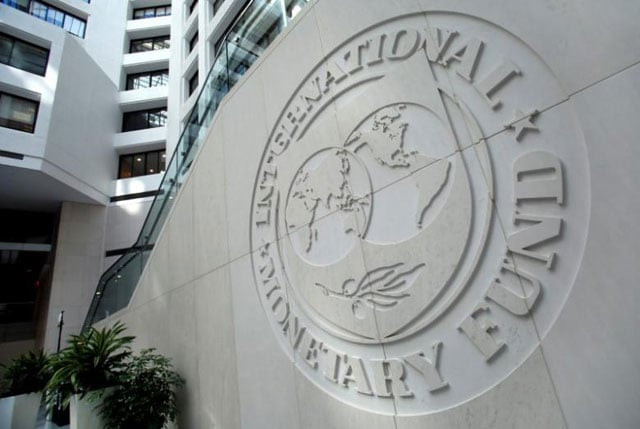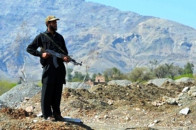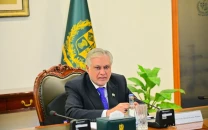Economy still poised for 5.6% growth: IMF
Welcomes SBP’s decision to allow adjustment of exchange rate

PHOTO: Reuters
But Finger underlined that the government needs to immediately move to correct the situation on its external and fiscal fronts and added that its policy actions would decide whether Pakistan can manage without the IMF’s financial support after June 2018.
“We have seen that political uncertainty that Pakistan has experienced for the last few months has decoupled from economic developments,” said Finger while responding to a question whether former prime minister Nawaz Sharif’s disqualification impacted the economy.
IMF says Pakistan’s hard-won economic stability at stake
He said Pakistan’s economic growth this year would strengthen to 5.6% from 5.3% during the last fiscal year. “But things will depend how the political and security situation evolves in the coming months,” said Finger while talking to the media at the conclusion of the Post-Programme Monitoring talks.
At the conclusion of the ten-day talks, the IMF stressed that Pakistan needs to undertake strong reforms efforts to maintain external stability, ensure debt sustainability and support higher economic growth in the medium term.
It cautioned Islamabad about “careful phasing in of new external liabilities to contain external stability risks” – in a veiled reference to CPEC-related repayment obligations.
Irked by PM’s absence, new IMF director cancels visit to Pakistan
The IMF mission chief’s statement about no implications of political uncertainty on the economy belies former PM Sharif’s claims that his ouster from power stopped the march towards economic growth.
“There is too much focus on political instability in Pakistan … and even if you have political difficulties nothing prevents from doing the homework that would enable faster implementation of structural reforms once political difficulties are resolved,” said Tokhir Mirzoev, the IMF’s Resident Representative in Islamabad.
Finger said in the coming months, Pakistan should focus on strengthening economic resilience by tightening fiscal deficit and also make sure that losses to international reserves are addressed.
He said there was also need to ensure that the right policies were in place for higher private investment, exports and jobs creation.
World Bank expects Pakistan's economy to grow 5.2%, but risks remain
“The most important question should be what the government needs to do in terms of economic reforms. Whether they do it with or without the IMF programme,” said Tokhir Mirzoev on a question whether Pakistan has requested another programme.
Finger said a key challenge for Pakistan’s economy will be managing through the political situation in the midterm and during this time focusing on stability issues --be it on the external side, declining reserves and containing fiscal deficit.
To a question whether Pakistan can manage without the IMF after June 2018, Finger said: “Certainly, it’s a difficult period for Pakistan at the moment and the success will depend on implementation of policies that are now put in place -- including on the exchange rate side and efforts to contain the fiscal deficit,”
IMF calls for ‘regular’ assessment of public debt structure
He said in addition external developments that were not in the control of the government would be a key to see where the country could manage without the IMF in July 2018.
Independent economists and a former secretary finance have recently predicted that Pakistan may need another IMF programme due to a precarious situation of the foreign currency reserves.
Despite borrowing $2.5 billion from international debt markets, the SBP’s official gross foreign currency reserves stood at $14.7 billion. Excluding its obligations, the net official reserves are below $5 billion, showed the official data of the Ministry of Finance and the SBP.
Finger said the IMF sees continuous pressures on the external side and foreign currency reserves. He said the decision by the SBP to allow adjustment of the exchange rate in past three days is welcomed.
“The decision to allow exchange rate depreciation was taken by the SBP and it is in line with the IMF’s recommendations,” said Finger while responding to a question whether the IMF dictated the depreciation.
IMF says Pakistan can manage without its support
The mission chief said depreciation of the rupee was a good, first step towards addressing Pakistan’s external sector problems.
“The focus should now be on putting in place policies to address external and fiscal imbalances and to ensure that the economy is on strong footing so that Pakistan does not require another IMF programme,” said Finger.
The official sais that maintaining the positive economic growth trend will require strengthening the economy’s resilience with greater exchange rate flexibility, fiscal discipline and an adequately tight monetary policy stance.
According to a hand-out that the IMF issued after the talks, the fund stressed that Pakistan needed strong reforms’ efforts to pursue medium-term fiscal consolidation, strengthen the monetary policy framework and careful phasing in of new external liabilities to contain external stability risks.
It also underlined that there was a need to eliminate losses in public sector enterprises and a decisive action to address the chronic issue of the power sector circular debt.



















COMMENTS
Comments are moderated and generally will be posted if they are on-topic and not abusive.
For more information, please see our Comments FAQ